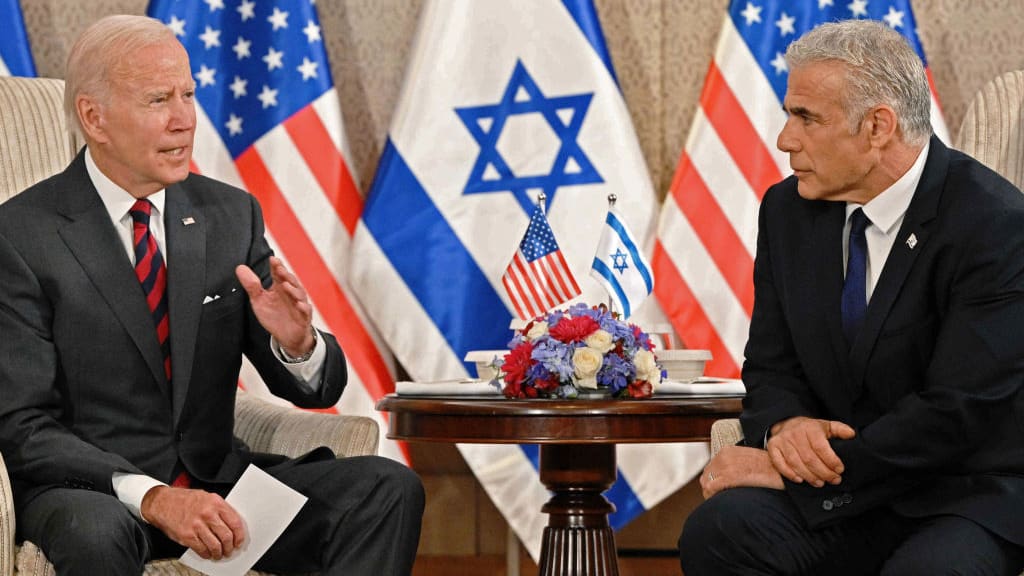Biden and Israel's Yair Lapid split on how to deal with Iran


A free daily email with the biggest news stories of the day – and the best features from TheWeek.com
You are now subscribed
Your newsletter sign-up was successful
President Biden and Israeli Prime Minister Yair Lapid reiterated during a joint press conference Thursday in Jerusalem that they will not let Iran become a nuclear power, but they aren't on the same page when it comes to dealing with the country.
Biden wants Iran to rejoin the nuclear deal that was brokered during the Obama administration and ditched by former President Donald Trump in 2018. He said the U.S. has let Iranian leadership know what to do in order to return to the deal, but they have yet to respond. "When that will come, I'm not certain," Biden said. "But we're not going to wait forever."
On Wednesday, Biden said using force against Iran is the last resort, and he told reporters on Thursday he continues to "believe that diplomacy is the best way" to approach the country.
The Week
Escape your echo chamber. Get the facts behind the news, plus analysis from multiple perspectives.

Sign up for The Week's Free Newsletters
From our morning news briefing to a weekly Good News Newsletter, get the best of The Week delivered directly to your inbox.
From our morning news briefing to a weekly Good News Newsletter, get the best of The Week delivered directly to your inbox.
As for Lapid, he is certain that "words" and "diplomacy" don't scare Iran, adding, "the only thing that will stop Iran is knowing that if they continue to develop their nuclear program the free world will use force." Still, he knows the U.S. and Israel are in full agreement that Iran cannot become nuclear. "I don't think there's a light between us," he said, adding, "we will not, let me say it again, we will not allow Iran to acquire a nuclear weapon."
Iranian President Ebrahim Raisi blamed the U.S. and "regional allies" for inflaming tensions in the Middle East, Iran's state-run news agency IRNA reports, and declared that "any mistake by the Americans and their allies in the region and the world will be met with a harsh and regrettable response."
Biden is on his first trip to Israel as president, and will visit Saudi Arabia on Friday. Lapid asked Biden to pass along a message to the Arab leaders he will meet in Jeddah: "Our hand is outstretched for peace." He called Biden's visit "important for Israel and the region. For our security and for the future prosperity of the Middle East."
A free daily email with the biggest news stories of the day – and the best features from TheWeek.com
Catherine Garcia has worked as a senior writer at The Week since 2014. Her writing and reporting have appeared in Entertainment Weekly, The New York Times, Wirecutter, NBC News and "The Book of Jezebel," among others. She's a graduate of the University of Redlands and the Columbia University Graduate School of Journalism.
-
 What to know before filing your own taxes for the first time
What to know before filing your own taxes for the first timethe explainer Tackle this financial milestone with confidence
-
 The biggest box office flops of the 21st century
The biggest box office flops of the 21st centuryin depth Unnecessary remakes and turgid, expensive CGI-fests highlight this list of these most notorious box-office losers
-
 What are the best investments for beginners?
What are the best investments for beginners?The Explainer Stocks and ETFs and bonds, oh my
-
 Judge blocks Hegseth from punishing Kelly over video
Judge blocks Hegseth from punishing Kelly over videoSpeed Read Defense Secretary Pete Hegseth pushed for the senator to be demoted over a video in which he reminds military officials they should refuse illegal orders
-
 Trump’s EPA kills legal basis for federal climate policy
Trump’s EPA kills legal basis for federal climate policySpeed Read The government’s authority to regulate several planet-warming pollutants has been repealed
-
 House votes to end Trump’s Canada tariffs
House votes to end Trump’s Canada tariffsSpeed Read Six Republicans joined with Democrats to repeal the president’s tariffs
-
 Bondi, Democrats clash over Epstein in hearing
Bondi, Democrats clash over Epstein in hearingSpeed Read Attorney General Pam Bondi ignored survivors of convicted sex offender Jeffrey Epstein and demanded that Democrats apologize to Trump
-
 El Paso airspace closure tied to FAA-Pentagon standoff
El Paso airspace closure tied to FAA-Pentagon standoffSpeed Read The closure in the Texas border city stemmed from disagreements between the Federal Aviation Administration and Pentagon officials over drone-related tests
-
 ‘The mark’s significance is psychological, if that’
‘The mark’s significance is psychological, if that’Instant Opinion Opinion, comment and editorials of the day
-
 Judge blocks Trump suit for Michigan voter rolls
Judge blocks Trump suit for Michigan voter rollsSpeed Read A Trump-appointed federal judge rejected the administration’s demand for voters’ personal data
-
 US to send 200 troops to Nigeria to train army
US to send 200 troops to Nigeria to train armySpeed Read Trump has accused the West African government of failing to protect Christians from terrorist attacks
